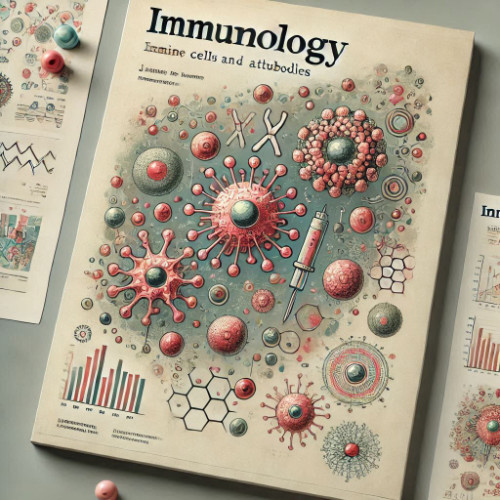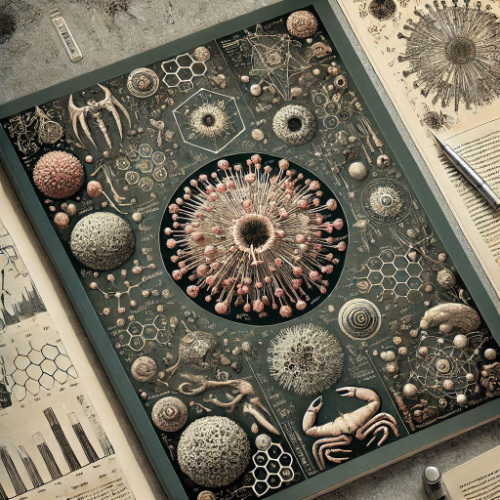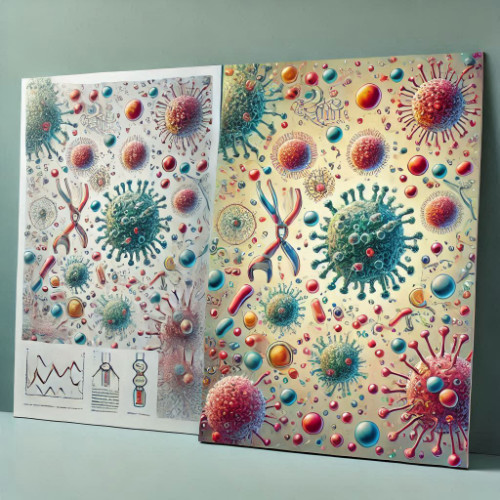Introduction
Immunology is the scientific study of the body’s defense mechanisms, a complex and highly specialized system that protects the body from harmful pathogens while maintaining tolerance to its own tissues. This critical field of medicine and biology explores how the immune system functions, why it sometimes fails, and how medical advancements can harness its power to prevent and treat diseases.
The immune system operates like a vast network of specialized cells, tissues, and organs working together to detect and neutralize threats. This natural defense barrier guards the body against bacteria, viruses, fungi, and toxins, playing a central role in health and disease prevention. Immunology goes beyond understanding infections—it also examines conditions where the immune system malfunctions, such as autoimmune diseases and allergies, making it one of the most pivotal areas of modern medicine.
As research expands, the insights gained from immunology continue to transform medical practices, from vaccine development to cutting-edge cancer treatments. This article will delve into the core principles of immunology, its components, and the remarkable ways it protects the body.
What Is Immunology? Definition and Core Concepts
Immunology is the branch of biomedical science concerned with the structure, function, and disorders of the immune system. It studies how the body identifies threats and mobilizes its defense mechanisms to protect against pathogens. The term originates from the Latin word immunis, meaning "exempt," reflecting the body's ability to resist infection after prior exposure.
The core principles of immunology include pathogen detection, cellular signaling, immune response coordination, and memory formation. These processes collectively enable the body to distinguish between self and non-self tissues, a fundamental concept in preventing infections while avoiding autoimmunity.
Historically, immunology emerged as a formal science in the late 18th century, with Edward Jenner's smallpox vaccine being a pivotal milestone. Since then, it has evolved into a multidisciplinary field encompassing microbiology, genetics, molecular biology, and clinical research.
The Key Functions of the Immune System

The immune system serves three primary roles in the body: defense, surveillance, and regulation. Each function is essential for maintaining overall health and preventing disease.
- Defense Against Pathogens: The immune system's most recognized role is to identify and eliminate pathogens such as bacteria, viruses, and fungi. It uses specialized cells and proteins to neutralize these threats before they can cause harm.
- Surveillance and Elimination of Abnormal Cells: Beyond infections, the immune system also identifies and removes damaged or mutated cells, including cancerous cells, through mechanisms like immune surveillance.
- Regulation and Immune Tolerance: Proper immune regulation prevents excessive inflammation and ensures tolerance toward the body's own tissues. A failure in this balance can result in autoimmune diseases.
These functions are coordinated through a series of cellular interactions and signaling molecules, ensuring a highly organized response to both external threats and internal abnormalities.
Components of the Immune System
The immune system is a vast, interconnected network composed of cells, tissues, and biochemical molecules. Each component plays a specialized role in detecting and neutralizing threats.
Physical and Chemical Barriers:
The first line of defense includes physical barriers such as the skin, mucous membranes, and stomach acid. These barriers provide a non-specific protective layer, preventing pathogens from entering the body.
Innate vs. Adaptive Immunity:
- Innate Immunity: This is the body’s rapid, non-specific response to pathogens, providing immediate defense through mechanisms like inflammation and phagocytosis.
- Adaptive Immunity: This system is slower but highly specific, involving B cells, T cells, and the production of antibodies. Adaptive immunity also creates memory cells, providing long-term protection after infection or vaccination.
Key Immune Cells and Their Roles:
- Macrophages and Neutrophils: Act as first responders, engulfing pathogens.
- Dendritic Cells: Present antigens to T cells, initiating adaptive immunity.
- B Cells: Produce antibodies targeting specific pathogens.
- T Cells: Destroy infected cells and regulate immune responses.
- Natural Killer (NK) Cells: Target virus-infected and abnormal cells without prior activation.
Together, these components form a multilayered defense system capable of neutralizing a vast range of pathogens.
Latest Articles and Publications



How the Immune Response Works
The immune response is a complex cascade involving cellular coordination and biochemical signaling, activated when the body detects a foreign substance known as an antigen.
Inflammation as the First Line of Defense:
Upon infection, cells release cytokines, signaling molecules that trigger inflammation. This response helps recruit immune cells to the site of infection while increasing blood flow, facilitating the delivery of defense mechanisms.
Antigen Presentation and Recognition:
Once a pathogen is detected, antigen-presenting cells (APCs), such as dendritic cells, capture fragments of the pathogen and present them on their surface using MHC (Major Histocompatibility Complex) molecules. This presentation alerts T cells, activating the adaptive immune response.
The Role of Memory Cells in Long-Term Protection:
Following infection, the immune system retains a memory of the pathogen through memory B cells and memory T cells. These cells provide faster, stronger protection upon subsequent exposures, forming the basis of vaccination.
Types of Immunity

The body utilizes multiple layers of immunity to provide both immediate and long-term protection against pathogens.
Natural vs. Artificial Immunity:
- Natural Immunity: Developed after infection and recovery.
- Artificial Immunity: Acquired through vaccination or passive antibody transfer.
Active vs. Passive Immunity:
- Active Immunity: Generated when the immune system responds to an infection or vaccine.
- Passive Immunity: Provided by external antibodies, such as maternal antibodies passed through breast milk.
Common Immunological Disorders
Despite its efficiency, the immune system can malfunction, leading to various health conditions.
Autoimmune Diseases: Conditions where the immune system attacks healthy tissues, such as rheumatoid arthritis, lupus, and multiple sclerosis.
Immunodeficiency Disorders: Result from a weakened immune system, either genetic (e.g., SCID) or acquired (e.g., HIV/AIDS).
Hypersensitivity Reactions and Allergies: An exaggerated immune response to harmless substances, causing conditions like asthma, hay fever, and anaphylaxis.
Advances in Immunology and Modern Medicine
Modern immunology has led to transformative medical advancements, reshaping how diseases are treated and prevented.
Vaccines and Their Global Impact: Vaccines have eradicated smallpox and drastically reduced the prevalence of diseases like measles and polio.
Immunotherapy for Cancer and Autoimmune Conditions: Therapies such as CAR-T cell therapy and monoclonal antibodies have revolutionized treatment for cancers and autoimmune diseases by harnessing the immune system's power.
Key Immunological Statistics and Data (Table)
| Condition/Discovery | Key Fact |
|---|---|
| Global Vaccination Coverage | 81% (WHO, 2022) |
| Autoimmune Disease Prevalence | Affects 5% of the global population |
| Annual Influenza Cases | 1 billion cases annually |
| HIV Management | Antiretroviral therapy reduces transmission by 97% |
Conclusion: Why Immunology Remains Critical in Modern Healthcare
Immunology stands at the heart of modern medicine, protecting public health through disease prevention, early detection, and innovative treatments. Whether it's vaccine development, cancer immunotherapy, or understanding autoimmune disorders, this field continues to expand our ability to fight disease and improve life expectancy.
As scientific advancements unlock deeper insights into how the immune system functions, the potential for personalized medicine, safer treatments, and global health improvements grows stronger. Immunology not only saves lives but also holds the key to solving some of humanity’s most challenging medical mysteries.
- By Professor Akiko Iwasaki



